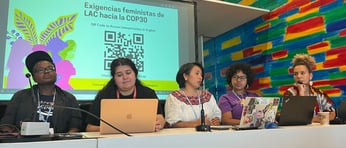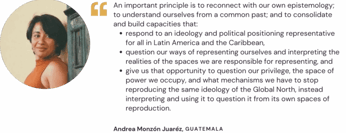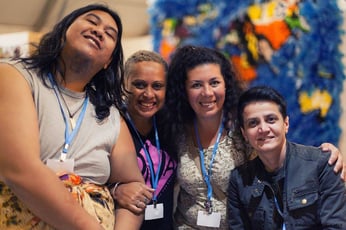Impact Story
Jun 27, 2025

As we collectively prepare for COP30 in Belém, Brazil, this November, it is crucial that women in all their diversities not only have a voice but also shape outcomes in international policymaking spaces.
We proudly supported four advocates to attend SB62, amplify regional voices, and advance feminist climate justice where it matters most.
These advocates, Chandelle O’Neil, Xiomara Acevedo, Natalia Tsuyama Cócolo, and Andrea Monzón Juaréz, from Trinidad and Tobago, Colombia, Brazil, and Guatemala, respectively, participated throughout SB62 spaces to advance feminist climate advocacy from the Latin America and Caribbean (LAC) region.
This week at SB62, we also hosted a dynamic side event together with the Women and Gender Constituency (WGC). This session spotlighted feminist voices from Africa to MENA to LAC and marked the launch of the LAC chapter of the WGC, as we build momentum and solidarity on the road to COP30.

Chandelle NT O’Neil is a mechanical engineer and human rights advocate with expertise in energy policy and climate education, who has contributed to UNICEF publications and conducted gendered policy analysis of Trinidad and Tobago’s climate commitments.

Xiomara Acevedo (@xioacevedo on Instagram) is an advocate, campaigner, defender, and entrepreneur from Fundación Barranquilla+20 and the Women for Climate Justice network (@mujeresxlajusticiaclimatica on Instagram).

Natalia Tsuyama Cócolo is a Brazilian public policy specialist and climate justice advocate. She represents Engajamundo and the Global Shapers Community, working at the intersection of gender, youth, and food systems in global and local processes.

Andrea Monzón Juaréz (Andre) is a Maya Mam and Maya Quiché woman representing tourism sector workers in Guatemala, with expertise in sexual/reproductive rights, food sovereignty, and indigenous knowledge systems.
The lively session spanned three languages fluidly (Spanish, Portuguese, and English) and was filled with the light and pain of multiple, diverse realities that are contained across Abya Yala (the decolonial term for America, as used by certain groups of Indigenous Peoples in the territory).
During the session, Xiomara, Chandelle, and Andrea were joined by:
Xiomara took us through the journey of feminism in the region, articulating how women and gender-diverse people in Latin America face intersecting violence from structural systems while still sustaining life and defending territories.
As Xiomara said:
“¡La COP30 será feminista o no será!”
“COP30 will be feminist or it will not be!”
Chandelle drove us back into the reality of the Caribbean — how it is often neglected or grouped with others when, in fact, it holds nuance caused by historical, geographical, and social differences and sustains such differentiated climate change impacts. The movement will not be inclusive if it does not recognize and bring to the table “the silent C in LAC.”
Mariana and Leticia shared their perspectives from Brazil. Mariana demanded that COP30 must become a milestone of historical reparation, one that centers the voices and leadership of those most impacted rather than continuing to marginalize them.
As Mariana clearly said:
“Não é possível falar em crise climática sem falar em racismo ambiental, injustiça de gênero e de classe.”
“It is not possible to talk about the climate crisis without talking about environmental racism, gender, and class injustice.”
Andrea brought forward questions around the transition from fossil fuels and what it means to have a just transition that is not on the backs of the Global South. She also talked about the privilege of being at SB62 and what it means to represent Latin America, wisely stating:
“Questioning our privilege is an act of love.”
Finally, Leticia established interlinkages with the Gender Action Plan and highlighted the struggles and achievements of integrating language about “Afro-descendent women” in UNFCCC and beyond.
As Leticia stated:
“O reconhecimento da categoria afrodescendentes não é uma vitória apenas para as mulheres afrodescendentes, para as mulheres brasileiras, para as mulheres latino-americanas, mas sim uma vitória para quem acredita em uma abordagem de gênero verdadeiramente interseccional.”
“The recognition of the category of Afro-descendants is not only a victory for Afro-descendant women, for Brazilian women, for Latin American women, but a victory for those who believe in a truly intersectional approach to gender.”
Resources

Support Our Work
Your donation provides us with the stable foundation we need to build the feminist future we’re working to realize.
Donate Today